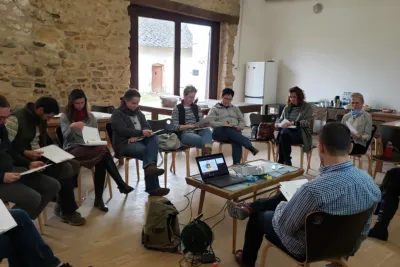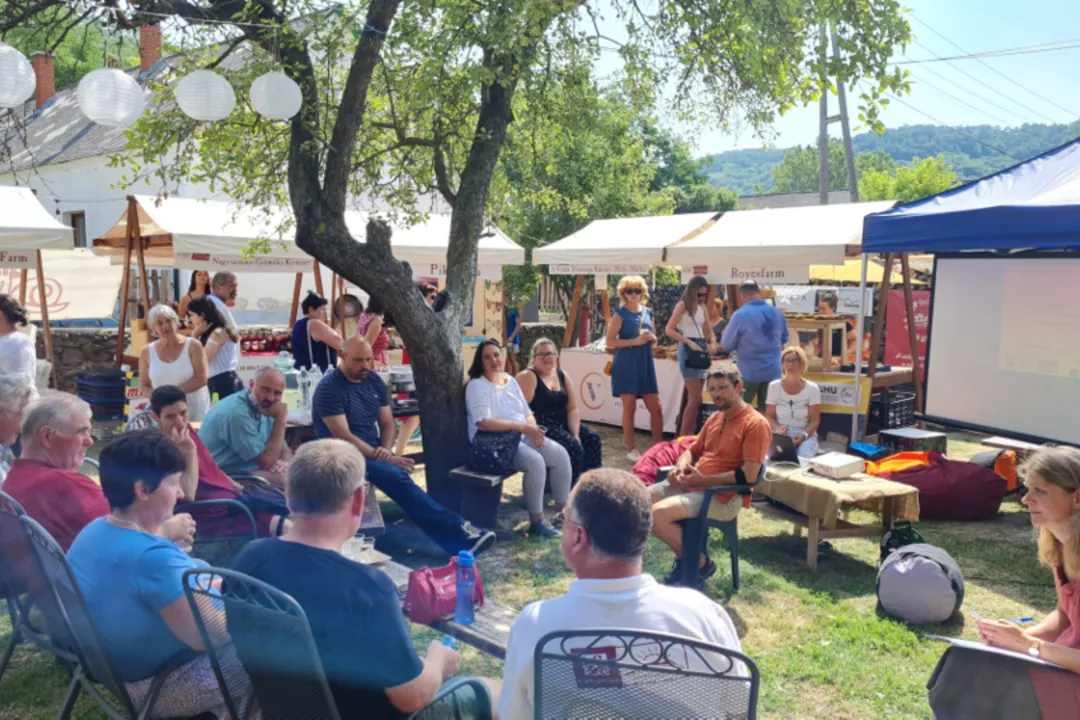General information
RDP Priority
- P3. Food chain and risk management
RDP Focus Area
- 3A: Agri-food chain integration & quality
RDP Measure
- M16: Cooperation
Beneficiary type
- Operational group
Summary
EU funding from the CAP in Hungary can foster local food networks through Operational Group (OG) support. Various types of local food networks can utilise OG resources, including short supply chains. An OG from Hungary’s Lake Balaton region successfully helped launch new farm restaurants, locally produced breakfast deliveries, other innovative local food services and new management software developed for the inventory of small producers’ working time and stock management.
This OG set out to identify and resolve challenges faced by local producers involved in short supply chains. Its members were a local agrifood consultancy company, three small cheese producers, one jam maker, and three researchers. Filling knowledge gaps about how to better optimise short supply chains was an OG cornerstone. Some EUR 91 000 of CAP funds were used by the OG for workshops, training small producers, consultancy support, research staff, communication campaigns, ICT tools and business equipment for OG members.
Results
- A notable OG result was the management software developed for the inventory of working time and stock management for small producers in food value chains – www.felirom.hu.
- All OG participants gained employment, revenue boosts, or other benefits from the OG funds.
- Two local cheesemakers purchased new business development equipment.
- Six innovative local food services were launched in the area.
- Two small producers put learning into practice about how to start selling ‘experience’ besides products.

Funding
Total project cost: 112 950 (EUR)
RDP support: 91 670 (EUR)
Private/own: 21 280 (EUR)
Topics
Resources
Context
EU funding from the CAP in Hungary can foster local food networks through Operational Group (OG) support. Various types of local food networks can utilise OG resources, including short supply chains.
OG members, such as farmers and food service providers, can establish systems that prioritise sustainable agriculture, enhance food sovereignty and promote regional products. These initiatives connect consumers directly with small producers and encourage sharing of best practices among short supply chain partners, thereby enhancing the overall resilience of local food systems.
Small producers can benefit from the establishment of these new local food networks. By participating in OG, small producers win access to resources that facilitate collaboration and innovation within their communities. For instance, consultancy costs, collective marketing strategies, and new equipment can be fully supported by OGs.
Additionally, OGs often provide training and support on sustainable agricultural practices, improving productivity while minimising environmental impacts within the OG. Such networking creates a sense of community among small producers and consumers alike. By facilitating direct relationships with customers through local markets or short supply chains, producers can build trust and loyalty while receiving fair payments for their products.
An OG from Hungary’s Lake Balaton region was launched by a group of agrifood firms who considered that the development potential of local agrifood products was hindered by less-effective business management systems. Its members were a local agrifood consultancy company, three small cheese producers, one jam maker and three researchers from Budapest. Filling knowledge gaps about how to better optimise short supply chains was an OG cornerstone.
Objectives
Simplified working time and stock records, as well as ICT tools, helped meet administrative obligations relating to food safety, which were key project goals.
A better understanding of business workflows and related stocking was a core ambition of the OG, which aimed to clarify options for improving business efficiency and purchase new equipment for two local cheesemakers using favourable CAP funding conditions. This OG would also help the lead consultancy company grow and provide well-paid employment for researchers, while expanding the OG’s local food services through better-coordinated and more efficient sales, transportation and marketing.
Specific OG research objectives were to identify:
- Challenges faced by small producers and identifying intervention points with the assistance of researchers.
- Time-consuming activities and try to replace them.
- Obstacles to integrating small producers into short supply chains.
- Areas that can be developed with researchers to help small producers in their complex production process.
Activities
Main OG actions brought together new agrifood development partners in rural Hungary for a local food network initiative involving the following schedule of OG actions:
- 09.09.2020 - 04.04.2021: Face-to-face interviews with 10 producers.
- 09.2020 - 10. 2023: Processing of research material on the topic and interviews with small-scale producers in other research in the Lake Balaton Uplands region.
- 09.2020: Cheesemaker Károly Dobossy upgrades his cheese-making workshop, purchasing two new large machines (pneumatic table and salt bathtub).
- 10.2020: Facebook and LinkedIn pages are created.
- 11.2020: Cheesemaker Bálint Szabó purchases a solar panel system to increase the energy efficiency of his cheese production.
- 01.2021- 03.2023: Production of five short films on small producers.
- 01.2021 - 09.2023: Development of working time and inventory management software.
- 04.2021 - 09.2023: Interviews with five local short supply chain owners.
- 06.2021: Production of a project presentation (introductory) film.
- 26.07.2021: Workshop with producers and researchers on the problems of small farmers.
- 12.12.2021: Workshop with producers and researchers on the rules for opening an on-farm restaurant.
- 10.03.2022: Workshop with small producers on smallholder business management.
- 18 and 23.01.2023: Workshop with producers and researchers on the small farm experience.
- 22.02.2023: Workshop with producers and researchers: effective marketing.
- 2023.09: Production of a summary film on the project.
- 06.06.2023 - 01.01.2024: Dissemination of presentations.
- 01.2024: Production of a project presentation brochure.
Main results
- A notable OG result was the management software developed for the inventory of small producers’ working time and stock management.
- All participants gained employment, revenue boosts, or other benefits from participating in the OG.
- Two local cheesemakers purchased new business development equipment under favourable CAP conditions.
- Five workshops were organised on different topics to cover knowledge gaps (small producers’ daily problems, on-farm restaurants called ’falusi vendégasztal’, how to sell an experience instead of products, effective marketing, smallholders' business management).
- As a result of the workshops, six innovative food services started in the region. These were a home restaurant, a breakfast delivery service, a place to drink refreshments (local fruit syrup) for cyclists, a local bakery that started a breakfast bar, and another local producer began a service of cooking traditional meals in the small local markets, where no cooked food was previously available.
- Two small producers put learning into practice about how to start selling ‘experience’ besides products.
- The local network of small producers was strengthened.
- New, innovative services emerged, enriching the area and making it more attractive to tourists.
- The OG connected researchers and small farmers to cover knowledge gaps and enable smallholders to develop their business one step further.
Key lessons
- Synergy created by the cooperation embedded in new local food networks, funded by the CAP, not only bolsters the economic viability of small producers but also contributes to a more resilient and sustainable agricultural sector in Hungary.
- This project was undertaken during the COVID-19 pandemic, when new sales methods were required. The community of small producers were willing to generate change. The OG offered a peer networking possibility for members to exchange expertise about business ideas and challenges.
- Digital tools for inventory management can significantly enhance operational efficiency by streamlining tracking of raw materials and finished products, ensuring that producers maintain optimal stock levels while minimising waste. By automating inventory processes, small food producers can allocate their limited resources more effectively, thereby increasing productivity.
- By sharing inventory data and insights across platforms, stakeholders can coordinate efforts more efficiently, ultimately leading to a more resilient local food system.
Our project targeted small-scale producers in the Lake Balaton Uplands. They are a very important part of the fabric of the local economy. Not only produce local food, but they also maintain the beautiful landscape that brings tourists here. They are also behind the stalls at the weekend markets, which are an important tourist attraction in the area, not to mention their role in the food supply. The main innovation of our project is that we have brought together actors who would not have met without us and without the project.
Gusztáv Nemes

